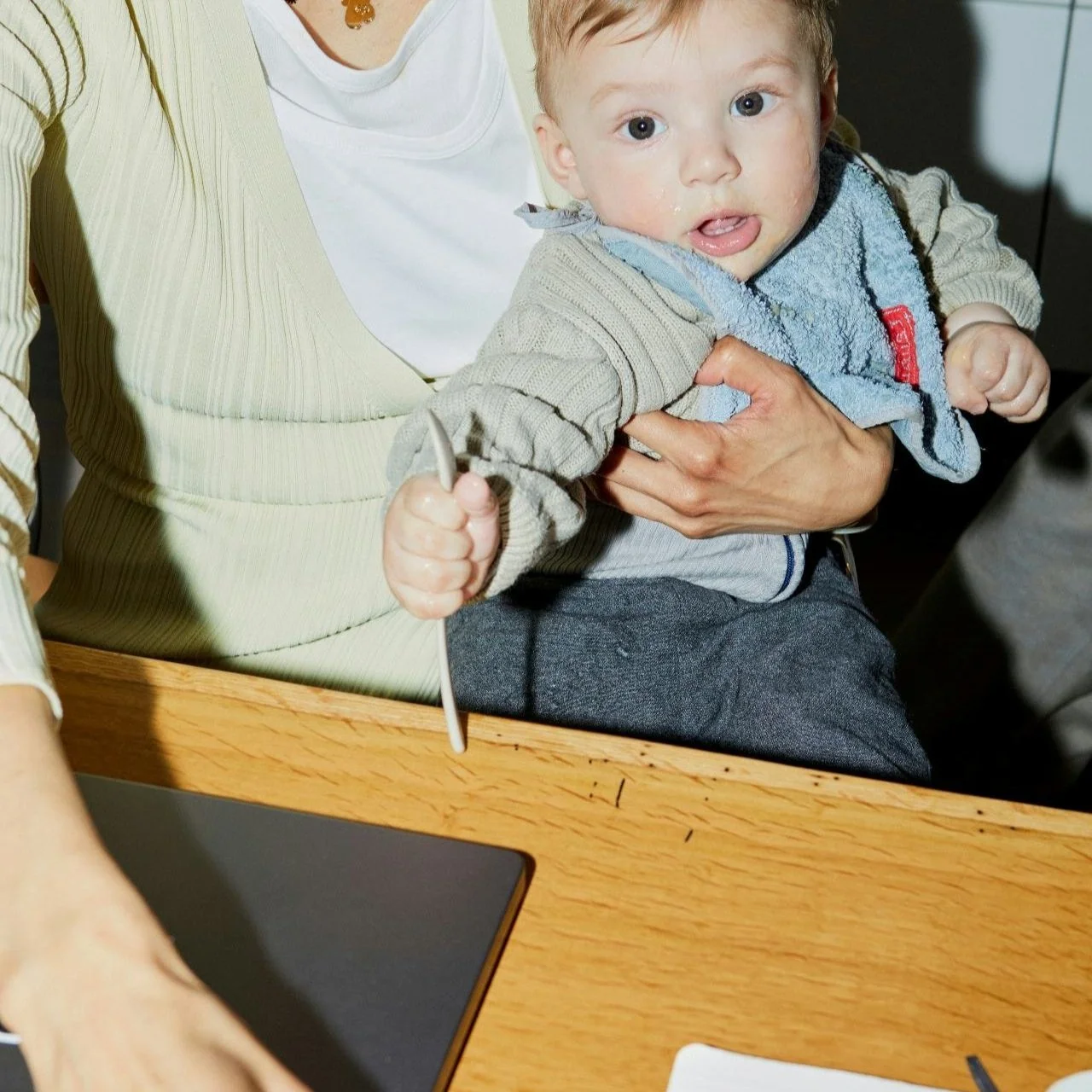Who Is Your Modern Village?
Modern Working Moms:
Why personalized postpartum support is essential for professional women —
and how virtual concierge care fills the gap.
The Village Now Looks Different
For generations, postpartum women were supported by a “village”—a web of family, friends, elders, and caretakers who provided guidance, meals, rest, and reassurance during one of life’s most demanding transitions. But for modern working women, that village has all but disappeared. Instead, they return from the hospital with a newborn in one arm and a laptop in the other, left to navigate physical recovery, emotional shifts, and work reentry often in isolation.
This gap in care isn’t just a personal inconvenience—it has serious long-term implications for maternal health, emotional well-being, and even infant outcomes. Studies show that women without adequate postpartum support experience higher rates of anxiety, depression, and delayed physical recovery, which in turn can impact their ability to care for their babies effectively (Sufredini et al., 2022).
Today’s professional women deserve a new kind of village—one that fits their lives, values their time, and coordinates the care they need with the same precision they bring into their careers and their everyday life.
The question today is what does support look like for the modern, working mom. This paper explores why virtual concierge postpartum care, delivered through personalized plans and proactive coordination, represents the new “village”—offering education, symptom tracking, expert referrals, and emotional well-being check-ins to help women thrive, not just survive.
January’s virtual postpartum concierge provides exactly that: personalized, high-touch support that integrates health, emotional, and lifestyle resources into a single plan—to bridge the gap from the laptop to their OB/GYNs or PCPs. We help activate the right support at the right time to improve outcomes, quality of life, and the return-to-work experience.
The Postpartum Gap: A Missed Opportunity in Women’s Health
The U.S. maternal health system is optimized for pregnancy and delivery but not recovery. ACOG recommends a single postpartum visit within 6 weeks, yet 40% of women never attend one, and the majority report unmet health needs months after childbirth (American College of Obstetricians and Gynecologists, 2018).
For working women, this gap is even more consequential. The transition back to work often happens during the peak of physical recovery, sleep deprivation, and mental health vulnerability. Without support, postpartum complications—from pelvic pain to depression—go unaddressed, leading to a lifetime of diminished well-being and productivity.
Support Works: Evidence-Based Outcomes of Postpartum Care
The benefits of coordinated postpartum support are well-documented. Women with access to care navigation, mental health check-ins, and symptom tracking experience faster recovery, lower rates of emergency care, and better mental health (Slomian et al., 2019; Liu et al., 2022).
One randomized study found that proactive postpartum care reduced depressive symptoms by 50% compared to usual care (Leach et al., 2016). Another showed that digital health support improved sleep quality and confidence in newborn care—especially for women balancing work responsibilities (Guille et al., 2020).
Virtual Concierge Support: A Modern, Personalized Approach
January offers a virtual postpartum concierge service that delivers personalized support via check-ins, care coordination, and educational materials tailored to each woman’s goals. We do not replace a physician or therapist—we collaborate with them.
Through personalized care plans, we:
Monitor physical and emotional symptoms
Coordinate referrals to vetted specialists (e.g., pelvic floor PTs, lactation consultants)
Educate on newborn care and maternal recovery
Advocate for women’s needs across the healthcare system
Real-World Data for Real-Time Health Decisions
One key feature of January’s support is guided symptom tracking—a lightweight, mobile-first way for women to log pain, mood, sleep, and feeding. These real-world data points allow our team to spot trends, flag concerns early, and personalize guidance accordingly.
Real-world evidence (RWE) is increasingly being recognized as a powerful tool in women’s health. Tools that track maternal symptoms have been shown to improve identification of postpartum depression, anemia, and pain-related complications (Ameyaw et al., 2024; Sardi et al., 2020). When shared with care teams, this data becomes actionable—helping women receive care when it matters most.
Proactive Check-ins Drive Better Outcomes
Rather than waiting for women to raise a flag, our model initiates proactive check-ins that assess symptoms, stressors, and needs. This approach has been shown to reduce missed diagnoses and enhance maternal satisfaction (Kozhimannil et al., 2020).
Regular touchpoints from care teams improve adherence to postpartum plans and reduce escalation to emergency care. In one study, structured postpartum check-ins reduced hospital readmissions by 50% (Howell et al., 2017). Our model integrates this insight—reaching out before women know they need it.
Supporting the Return to Work
More than 70% of U.S. women with children under age 18 are in the workforce (U.S. BLS, 2023). Yet, few return to work with a health plan that accounts for physical recovery, breastfeeding logistics, or mental resilience.
We help women plan their return through scheduling strategies, professional development, pumping education, and mental health support. This care coordination doesn’t just protect physical health—it supports confidence, retention, and equity in the workplace.
Postpartum Is Forever After: Building the Midlife Momentum
While postpartum is clinically defined as the first six weeks, its physical and emotional effects extend far beyond that. Symptoms like pelvic floor issues,hormonal changes, anxiety, and fatigue can persist for 6–12 months or longer—especially in working mothers who put newborns first and their own self-care last.
January provides comprehensive support that extends far beyond early postpartum recovery. Our Postpartum Wellness & Recovery program bridges the gap into sustained well-woman care, continuing up to one year and beyond. We coordinate care, monitor long-term health indicators, and proactively support women through evolving milestones such as weaning, returning to intimacy, reestablishing fitness routines, and navigating the complex transition back to work.
Importantly, we introduce the concept of a a guided, supportive phase that connects postpartum recovery to the steadier state of well-woman health. This bridge ensures continuity in care during a time when women are no longer in acute recovery, but not yet preparing for their next major life transition, such as another pregnancy or the onset of perimenopause.
Postpartum is not a short-term event—it is the beginning of a lifelong physiological and psychological transformation. Women deserve a care model that evolves with them, providing the right level of support at every stage. January is here to be part of that long-term modern village.
Conclusion: A New Kind of Village, For a New Kind of Mother
Postpartum recovery is not a solo endeavor—and it was never meant to be. Today’s working mothers face unprecedented pressures to do it all, often at the cost of their own health. Postpartum recovery is no longer just about survival—it’s about thriving in a new life stage.
But support systems can evolve, just as work and family life have. A modern village doesn’t need to be built from scratch; it can be accessed, coordinated, and personalized through the right tools and people. For today’s working women, that requires a coordinated, proactive, and human approach that adapts to their needs and empowers their voices.
January is the modern village—an ally, advocate, and guide for postpartum and beyond. It doesn’t replace OB/GYNs, PCPs, or lactation consultants—it empowers women to access them exactly when they need to. We believe every mother deserves care that is as ambitious and forward-thinking as she is.
Modern motherhood deserves modern solutions. The village isn’t gone, it’s just been reimagined.
References
American College of Obstetricians and Gynecologists (ACOG). (2018). Optimizing Postpartum Care. https://www.acog.org
https://www.acog.org/-/media/project/acog/acogorg/clinical/files/committee-opinion/articles/2018/05/optimizing-postpartum-care.pdf
Bauman BL, Ko JY, Cox S, D'Angelo Mph DV, Warner L, Folger S, Tevendale HD, Coy KC, Harrison L, Barfield WD. Vital Signs: Postpartum Depressive Symptoms and Provider Discussions About Perinatal Depression - United States, 2018. MMWR Morb Mortal Wkly Rep. 2020 May 15;69(19):575-581. doi: 10.15585/mmwr.mm6919a2. PMID: 32407302; PMCID: PMC7238954. https://pubmed.ncbi.nlm.nih.gov/32407302/
Centers for Disease Control and Prevention (CDC). (2022). Depression Among Women. https://www.cdc.gov/reproductivehealth/depression/index.htm
Slomian, J., Honvo, G., Emonts, P., Reginster, J. Y., & Bruyère, O. (2019). Consequences of maternal postpartum depression: A systematic review. Archives of Women’s Mental Health, 22(5), 529–541.
Liu, C. H., Tronick, E., & Valentine, G. (2022). The long tail of postpartum mental health. Maternal and Child Health Journal, 26, 1–7.
Leach, L. S., Poyser, C., Cooklin, A. R., & Giallo, R. (2016). Prevalence and course of anxiety disorders (and symptom levels) in men across the perinatal period: A systematic review. Journal of Affective Disorders, 190, 675–686.
Guille, C., Newman, R., Fryml, L., Lifton, C. K., Epperson, C. N. (2020). Telemedicine-based mental health treatment for postpartum women: A randomized controlled trial. Psychiatric Services, 71(5), 462–468.
Kozhimannil, K. B., et al. (2020). Enhancing postpartum care for women with Medicaid: A randomized controlled trial. Health Affairs, 39(3), 388–396.
Howell, E. A., Egorova, N. N., Balbierz, A., Zeitlin, J., & Hebert, P. L. (2017). Black-white differences in severe maternal morbidity and site of care. American Journal of Obstetrics & Gynecology, 214(1), 122.e1–122.e7.
Ameyaw EK, Amoah PA, Ezezika O. Effectiveness of mHealth Apps for Maternal Health Care Delivery: Systematic Review of Systematic Reviews. J Med Internet Res. 2024 May 29;26:e49510. doi: 10.2196/49510. PMID: 38810250; PMCID: PMC11170050. https://pubmed.ncbi.nlm.nih.gov/38810250/
Sardi L, Idri A, Redman LM, Alami H, Bezad R, Fernández-Alemán JL. Mobile health applications for postnatal care: Review and analysis of functionalities and technical features. Comput Methods Programs Biomed. 2020 Feb;184:105114. doi: 10.1016/j.cmpb.2019.105114. Epub 2019 Oct 16. PMID: 31655305; PMCID: PMC9052424. https://pubmed.ncbi.nlm.nih.gov/31655305/
Saldanha IJ, Adam GP, Kanaan G, et al. Health Insurance Coverage and Postpartum Outcomes in the US: A Systematic Review. JAMA Netw Open. 2023;6(6):e2316536. doi:10.1001/jamanetworkopen.2023.16536 https://jamanetwork.com/journals/jamanetworkopen/fullarticle/2805510?utm_source=openevidence&utm_medium=referral
Siafarikas F, Halle TK, Benth JŠ, Stær-Jensen J, Reimers C, Bø K, Engh ME. Pelvic floor symptoms from first pregnancy up to 8 years after the first delivery: a longitudinal study. Am J Obstet Gynecol. 2022 Oct;227(4):613.e1-613.e15. doi: 10.1016/j.ajog.2022.06.020. Epub 2022 Jun 17. PMID: 35724758. https://pubmed.ncbi.nlm.nih.gov/35724758/
Sufredini F, Catling C, Zugai J, Chang S. The effects of social support on depression and anxiety in the perinatal period: A mixed-methods systematic review. J Affect Disord. 2022 Dec 15;319:119-141. doi: 10.1016/j.jad.2022.09.005. Epub 2022 Sep 13. PMID: 36108877. https://pubmed.ncbi.nlm.nih.gov/36108877/
Holicky A, Horne A, Bennett AC. Low Social Support is Associated With Postpartum Depression Symptoms Among Illinois Postpartum Women. Birth. 2025 Jun;52(2):320-328. doi: 10.1111/birt.12889. Epub 2024 Oct 18. PMID: 39422516; PMCID: PMC12006437. https://pubmed.ncbi.nlm.nih.gov/39422516/
Petersen EE, Davis NL, Goodman D, Cox S, Mayes N, Johnston E, Syverson C, Seed K, Shapiro-Mendoza CK, Callaghan WM, Barfield W. Vital Signs: Pregnancy-Related Deaths, United States, 2011-2015, and Strategies for Prevention, 13 States, 2013-2017. MMWR Morb Mortal Wkly Rep. 2019 May 10;68(18):423-429. doi: 10.15585/mmwr.mm6818e1. PMID: 31071074; PMCID: PMC6542194.https://pubmed.ncbi.nlm.nih.gov/31071074/
Webb DA, Bloch JR, Coyne JC, Chung EK, Bennett IM, Culhane JF. Postpartum physical symptoms in new mothers: their relationship to functional limitations and emotional well-being. Birth. 2008 Sep;35(3):179-87. doi: 10.1111/j.1523-536X.2008.00238.x. PMID: 18844643; PMCID: PMC3815625. https://pubmed.ncbi.nlm.nih.gov/18844643/
Pawlukowska, I., & Klimowicz, K. (2020). Mobile health technologies in postpartum care. European Journal of Public Health, 30(Supplement_5), ckaa165-775.
Gunderson, E. P., & Lewis, C. E. (2018). Chronic disease risk after pregnancy. Obstetrics & Gynecology Clinics, 45(2), 179–194.
U.S. Bureau of Labor Statistics (BLS). (2023). Women in the Labor Force. https://www.bls.gov
WHO 2022 https://www.who.int/news/item/30-03-2022-who-urges-quality-care-for-women-and-newborns-in-critical-first-weeks-after-childbirth





